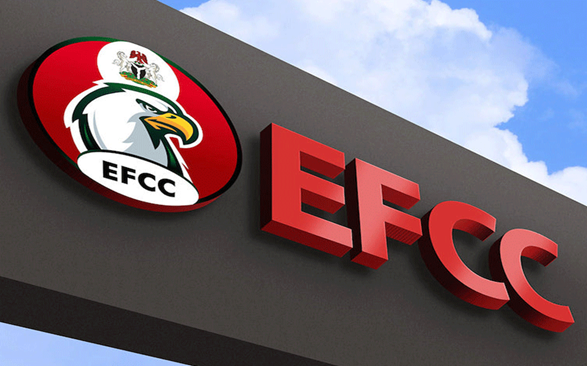Nigeria has consistently ranked among the top nations globally in terms of cryptocurrency or virtual asset usage and interest. Over the years, the country has taken gradual steps towards recognizing and regulating virtual assets, driven by growing public interest and the country’s youthful, tech-savvy population. However, the use of virtual assets to carry out or facilitate corruption and other financial crimes like investment scams in the country has become a serious concern amongst stakeholders today.
In a stakeholder engagement marking this year’s African Anti-Corruption Day in Lagos, the Economic and Financial Crimes Commission (EFCC) raised concerns over the growing trend of virtual asset and investment scams in Nigeria. The EFCC warned that fraudsters are increasingly leveraging virtual assets to scam unsuspecting investors.
On behalf of Ola Olukoyede, the EFCC Chairman, Ahmed Ghali, Acting Zonal Director of EFCC’s Lagos Zonal Directorate 2, delivered the welcome address at the Commission’s office on Okotie Eboh Street, Ikoyi, Lagos. In the welcome address, the EFCC Chairman raised the alarm that virtual assets and investment scams could surpass (regular) money laundering in Africa if all stakeholders do not work together to curb it.
The EFCC Chairman’s address was highlighted by ACE II Abbah Sambo Usman, Head of the Advance Fee Fraud Section, Lagos Zonal Directorate 2.
Read also: Virtual assets and investment scams could surpass regular money laundering – EFCC Chairman
Key Points from the Keynote Address
Types of Investment Fraud:
The EFCC identified several types of investment fraud, including:
- Ponzi Schemes: Fraudulent investment scams where returns are paid to earlier investors using the capital of others.
- Rug Pulls: Scams in decentralized finance (DeFi) where developers abandon a project and abscond with investor funds.
- Fake Trading Platforms or Apps: Scammers create fake platforms or apps to trick investors into depositing funds.
- Phantom Projects: Scams where projects have no real technology or utility.
- Fake ICOs (Initial Coin Offerings): Scammers create fake ICOs to raise funds from investors.
Regulatory Framework:
The EFCC, Securities and Exchange Commission (SEC), Central Bank of Nigeria (CBN), and Nigerian Financial Intelligence Unit (NFIU) are working together to regulate virtual assets and prevent investment scams.
The EFCC highlighted several warning signs of virtual asset investment fraud, including:
- Unrealistic Returns: Promises of guaranteed high returns or pressure to invest quickly.
- Anonymous or Untraceable Organizers: Lack of transparency about the project’s team or leadership.
- Lack of Regulatory Oversight: Failure to register with regulatory agencies or comply with relevant laws.
- Unverified Platforms or Wallets: Lack of transparency about the platform or wallet used for transactions.
EFCC’s Strategy:
The EFCC is taking a multi-pronged approach to combat virtual asset scams, including the following:
- Increased Public Engagement: Educating the public about the risks of virtual asset scams.
- Improved Intelligence-Driven Investigation: Using intelligence to track and investigate virtual asset scams.
- Collaboration with Stakeholders: Working with regulatory agencies, law enforcement, and industry stakeholders to prevent virtual asset scams.
- Asset Recovery: Tracing and recovering assets stolen through virtual asset scams.
The EFCC has also partnered with the National Orientation Agency (NOA) to launch a nationwide sensitization campaign aimed at educating Nigerians about the dangers of cybercrime and promoting a culture of financial integrity.
Read also: Why CBEX Will Happen Again in Nigeria, If Stakeholders Don’t Do Things Differently
Concerns Raised by Industry Stakeholders
Blocked Virtual Asset Websites:
Lucky Uwakwe, Chairman of the Blockchain Industry Coordinating Committee of Nigeria (BICCoN), has expressed concerns over the blocked access to virtual asset platforms in Nigeria since 2023. According to Mr Uwakwe, this blockage creates a risk as bad actors and criminal platforms like CBX fill the gap, targeting unsuspecting Nigerians with investment scams and fraud. He appealed to the Nigerian authorities to clarify their stance on the blocked websites, considering the circumstances leading to the blockage may no longer apply.
Lack of Collaboration between EFCC and Industry Operators:
Mr Uwakwe also highlighted the need for better collaboration between the EFCC and industry operators, calling for a periodical roundtable to enable review of action steps and progress made. He emphasized that the lack of collaboration leads to crypto-related Ponzi schemes, scams, and illicit transactions that could be mitigated through joint efforts.
Also, Senator Ihenyen, Executive Chair of the Virtual Asset Service Providers Association (VASPA) emphasized that transparency is key to preventing crypto-related crimes, such as money laundering, tax evasion, and terrorism financing, and the way to achieve transparency is to implement inclusive policies and regulations and multi-stakeholder engagements. Also a member of BICCoN, Mr Ihenyen pointed out that opacity often results in the darkness that enables crypto-related crimes to thrive. He advocated for regulators and law enforcement agencies to work with industry stakeholders to introduce policies and systems that promote transparency in the virtual asset system. By doing so, illicit transactions can be reduced, and trust and confidence can be built in the system.
Lessons from the CBN Ban:
Mr Ihenyen cited the negative consequences of the now-lifted CBN ban on cryptocurrency-related transactions in 2021, which lasted until the end of 2023. He noted that the effects of the ban are still being felt in the sector and beyond, and therefore appealed for a more nuanced approach to regulation that balances innovation with risk management, in order to ensure improved transparency.
Self-Regulation and Industry Efforts:
Mr Ihenyen, who is also Lead Partner at Infusion Lawyers, highlighted the efforts the virtual asset industry has been making over the years by adopting self-regulation in the absence of regulatory frameworks, demonstrating the industry’s commitment to sanitizing the space. The VASPA Executive Chairman appealed to the EFCC and other public agencies for more support for self-regulatory efforts that complement government’s efforts. Also, Mr Ihenyen pointed out that the registration and licensing process for VASPs needs to be accelerated by the SEC to enable legitimate operators to do business, thus discouraging bad actors from setting up shops that scam unsuspecting investors in the space.
Certification System and Use of AI to Boost Trust in Virtual Asset Sector:
Buki Ogunsakin, Vice Chair of Programs and Communication at the VASPA, recommended that the EFCC consider partnering with VASPA to introduce a tiered certification system for the virtual asset sector. This system, which can be enabled by regulatory technology (RegTech), would aim to promote legitimacy and credibility. According to Mrs Ogunsakin, this proposed certification system would discourage bad actors from operating in the sector and enable members of the public to easily identify credible players in the industry.
Furthermore, Mrs Ogunsakin, who is also Principal at BBO Solicitors, emphasized the critical need to deploy AI as a strategic tool to mitigate resource constraints within the agency, particularly as cybercriminals increasingly exploit AI-driven tactics to escalate illicit activities. She proposed collaborating to deploy specific applications to track digital assets and anomalies derived from aggregated data across the VASPA ecosystem.
Commendation to the EFCC:
The VASPA Executive Chair commended the EFCC for its efforts in combating crypto-related crimes in Nigeria, acknowledging the challenges they face in handling an increasing number of cases with limited resources. He emphasized the importance of collaboration between the EFCC, other law enforcement agencies, regulators, and industry stakeholders to proactively address the challenges posed by Ponzi schemes and investment scams.
By working together, regulators, law enforcement agencies, and industry stakeholders can create a more transparent and trustworthy virtual asset system in Nigeria.
EFCC’s Commitment to Collaboration
In his response, the EFCC Chairman acknowledged the concerns raised and assured the participants that the EFCC is committed to combating financial crimes through various strategies, including stakeholder engagements. The Chairman said EFCC is ready to collaborate with stakeholders in the virtual asset industry towards taking more proactive steps to fight crypto-related crimes in the country.
The EFCC plans to engage with VASPA, BICON, and other representatives in the coming weeks to discuss the proposal. By working together, industry stakeholders and regulatory agencies can create a safer and more transparent environment for investors. This commitment underscores the importance of cooperation in regulating the virtual asset industry.
Other senior EFCC officers who participated at the event include the Head of Investigation, Lagos Zonal Directorate 2 ACE II Moses Oguzi; the Head of Forensics, Lagos Zonal Directorate ACE II Joshua Oloye; and ACE I Deborah Ademu-Eteh, Deputy Director, Legal.
Read also: Clampdowns, Crackdowns, and Shutdowns in Crypto Town: Responsible regulation is what Nigeria needs.
Discover more from Crypto Asset Buyer
Subscribe to get the latest posts sent to your email.





